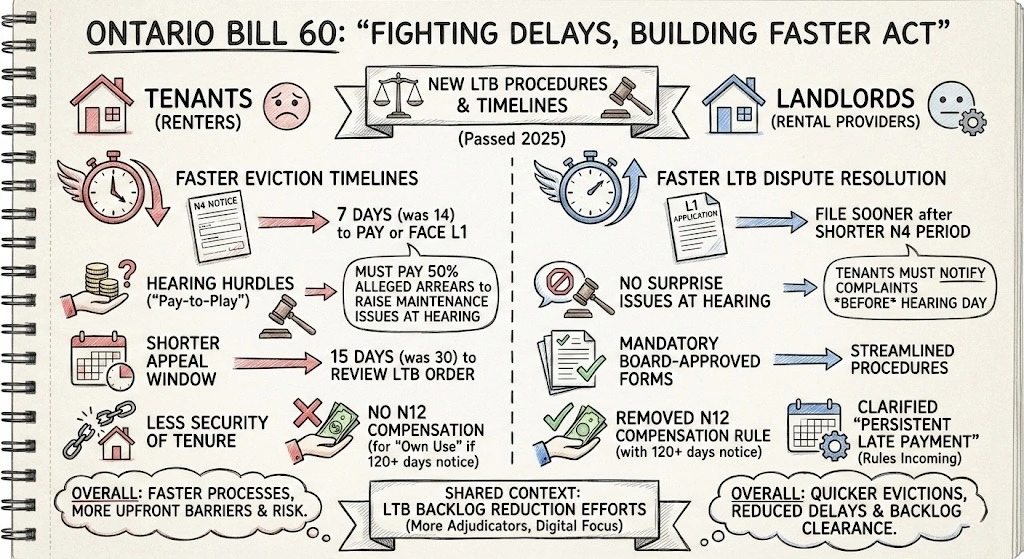Bill 60 is reshaping how rental disputes move through Ontario’s Landlord and Tenant Board, and both landlords and tenants are feeling the impact. The goal is simple: reduce delays and clear the backlog that has frustrated people on both sides for years. The core protections in the Residential Tenancies Act are still in place, but the way issues are raised and resolved now works on tighter timelines.
Landlords may benefit from faster non payment hearings and fewer last minute surprises. Tenants, on the other hand, need to act earlier, document problems in writing, and be ready to pay half of any claimed arrears if they want to challenge them at the LTB. These changes make preparation more important than ever and have raised questions about how vulnerable renters will manage the quicker pace. Understanding what Bill 60 actually changes is the first step in staying protected.
Overview of Bill 60 and Its Impact
Landlord and Tenant Board procedures in Ontario have been reshaped under Bill 60, officially called the Fighting Delays, Building Faster Act, 2025. Passed on November 24, the bill is intended to speed up rental dispute resolution, shorten eviction timelines, and clear the backlog that has built up in recent years. The core protections in the Residential Tenancies Act, 2006 still apply, so the right to rent control and security of tenure remains in place.
One of the biggest changes is how quickly non payment cases can move forward. Landlords can now issue a termination notice that takes effect in as little as seven days. At the same time, tenants face new limits on raising counter claims at these hearings. Issues such as repairs or maintenance can still be brought up, but only if the tenant meets new requirements, including paying half of the claimed arrears before the hearing.
Overall, Bill 60 creates a faster and more structured process, but it also places more pressure on tenants who may already be struggling with financial or housing concerns.
Key Changes for Landlords Under Bill 60
Faster LTB Timelines
Bill 60 accelerates how quickly the LTB can schedule and resolve cases. Long wait times have been a persistent issue for both landlords and tenants, and these updates aim to clear the backlog. With hearings and decisions happening sooner, landlords can take necessary steps, such as pursuing non-payment applications, without months of uncertainty.
For tenants, the faster pace means they need to respond quickly to notices and prepare their evidence earlier. The LTB is also prioritizing urgent matters like non-payment, which puts added pressure on tenants who may already be struggling. In practice, both sides must adapt to tighter timelines, but landlords stand to benefit from the increased predictability.

Shorter Notice Periods for Non-Payment
With the shorter N4 notice period, landlords no longer need to wait as long before taking action when rent goes unpaid. This allows an L1 application to be filed sooner, which speeds up the entire eviction process. For tenants, this means less time to resolve arrears before the situation escalates. It also reinforces the importance of paying rent on time or communicating early if there’s a problem.
For landlords, this change improves their ability to manage cash flow and avoid prolonged non-payment. Staying on top of the updated timelines ensures they can use the new rules effectively.
The 50% Arrears Requirement
The 50% arrears rule is a significant change in how disputes are handled at the Landlord and Tenant Board. This rule requires tenants who wish to counter-claim, such as for repairs or other issues, to pay at least half of their overdue rent first. By doing this, the LTB aims to keep the focus of hearings primarily on rent issues, rather than allowing unrelated disputes to complicate matters. For landlords, this means they can present their cases with more certainty, knowing that tenants cannot simply use repair claims to delay rent payments.
However, this rule poses challenges, particularly for low-income tenants who may find it difficult to pay even 50% of their arrears. It puts them in a tough position, as they must prioritize their finances carefully to contest claims effectively. Landlords benefit from clearer proceedings because they won’t have to deal with surprise claims at hearings, which can disrupt the process. Overall, this rule is part of a broader effort to streamline LTB processes and reduce delays, but it underscores the need for tenants to be strategic in managing their financial obligations.
No More Surprise Issues at Hearings
Tenants must now inform landlords of any complaints before the hearing, which helps eliminate surprise allegations that can stall proceedings. This encourages better communication and gives landlords time to prepare, review documents, and bring relevant evidence.
For example, if a tenant plans to raise a maintenance issue, they must notify the landlord ahead of time. This structured approach keeps hearings focused and helps both parties understand what will be discussed. It also supports a fairer and more organized process.
Expedited Eviction Orders and Their Effects
Eviction orders are now processed more quickly, reducing the gap between a decision and the actual enforcement. This is significant for landlords who rely on timely turnover to maintain their income. Faster enforcement limits losses and helps landlords regain control of their units sooner.
For tenants, however, this creates more urgency. They may have less time to arrange payment plans, seek assistance, or prepare to move. The change strengthens the system’s efficiency, but it also raises the stakes for tenants already facing financial hardship.
This shift marks a meaningful change in how landlord-tenant disputes unfold. Landlords benefit from faster resolutions, while tenants face tighter timelines that require prompt action and awareness of their rights.
Key Changes for Tenants Under Bill 60

Core Rights Still Protected for Tenants
Despite the procedural changes introduced by Bill 60, essential tenant rights remain fully protected. Tenants cannot be evicted simply because a lease has expired, ensuring continued security of tenure. Rent control measures are still in place, preventing sudden or excessive rent increases that could make housing unaffordable. Staying informed about rights and responsibilities under the Residential Tenancies Act is especially important now, as faster eviction processes may create added pressure.
These rights provide critical protections against potential landlord abuses. Tenants can appeal decisions made at the Landlord and Tenant Board, giving them a chance to challenge unfavorable outcomes. Landlords must follow the law and cannot evict without just cause. With shorter timelines for eviction cases, tenants need to assert their rights proactively. Accessing legal aid and tenant support services can help tenants navigate disputes and ensure they are treated fairly. Maintaining awareness of these protections helps tenants safeguard their homes as the eviction process evolves.
Importance of Timely Issue Reporting
Timely issue reporting is crucial for both tenants and landlords in the context of the new LTB procedures. Tenants should make it a priority to report problems as soon as they arise, as this strengthens their cases during hearings. For instance, if a tenant experiences a plumbing issue, notifying the landlord immediately in writing not only documents the complaint but also allows for quicker resolution. Prompt reporting can help prevent disputes from escalating into eviction proceedings, fostering a healthier landlord-tenant relationship.
Landlords are encouraged to address maintenance or repair concerns swiftly, and when tenants communicate issues promptly, landlords may be more willing to cooperate. Keeping written records of all communications regarding reported issues is essential for tenants, as it supports their claims if disputes arise. In addition, failure to report problems quickly could weaken a tenant’s position in any potential hearings, making it vital for tenants to engage proactively with their landlords. This shift towards timely reporting promotes a more collaborative atmosphere, benefiting both parties and ensuring that rights and interests are protected.
Challenges with the 50% Arrears Rule
The 50% arrears rule creates significant difficulties for tenants, especially those with limited incomes. Paying half of overdue rent to file a counter-claim can be impossible for many, discouraging them from raising legitimate concerns about repairs or other issues in their rental units. Landlords may also leverage this rule to pressure tenants into settling arrears even when disputes are valid.
This financial strain can trap tenants in a cycle of debt and eviction, while limited access to legal aid may leave them unrepresented at hearings. The rule increases the risk of poor financial decisions, such as taking high-interest loans, and may foster distrust toward the LTB. Overall, the 50% arrears requirement can intensify legal disputes and create additional challenges for vulnerable tenants.
Preparing for Shorter Hearing Timelines
Bill 60 introduces shorter hearing timelines at the Landlord and Tenant Board, requiring both tenants and landlords to act quickly. Tenants must gather evidence, document communications, and prioritize key issues, while landlords need to organize responses and present cases efficiently. The reduced time increases stress and the risk of rushed decisions, potentially leading tenants to accept settlements without full understanding or landlords to overlook critical evidence.
Early legal advice is recommended to navigate the expedited process. Tenants should keep thorough records of communications and familiarize themselves with new rules, ensuring they can respond effectively. Being prepared helps both parties adapt to tighter deadlines and reduces the likelihood of surprises during hearings.
Risks of Quick Evictions for Tenants
Faster eviction processes pose serious risks for tenants, including sudden homelessness and limited time to seek legal assistance or negotiate payment plans. Expedited hearings can prevent tenants from presenting a full defense, increasing the chance of unfavorable outcomes. Vulnerable groups, such as families and individuals with disabilities, are especially at risk.
Quick evictions also create broader community challenges, straining social services and shelters, and increasing tenant turnover for landlords. These fast processes can disrupt lives, reduce community stability, and have negative impacts on mental and physical health. Understanding these risks highlights the importance of timely reporting, proactive communication, and awareness of tenant rights under Ontario law.
Criticism and Concerns about Bill 60

Critics warn that Bill 60, the new legislation affecting rental laws in Ontario, shifts power toward landlords, potentially undermining tenant protections and destabilizing housing. Several advocacy groups and housing experts have raised concerns about unintended consequences.
Erosion of Tenant Protections and Security
A primary concern is the risk to tenants’ long-term housing stability. By changing lease structures and eviction rules, Bill 60 may weaken legal safeguards that maintain security of tenure. Critics argue this favors landlords while reducing rent protections.
Under Bill 60, eviction procedures become more streamlined, but tenants may lose the ability to introduce new evidence at hearings, limiting their chance to raise issues such as necessary repairs or maintenance. This faster process increases the risk that tenants could be removed from their homes before having a fair opportunity to defend themselves.
Reduced Access to Justice for Vulnerable Tenants
Bill 60 requires tenants to pay 50 percent of alleged arrears before filing a counter-claim or defence in eviction hearings. Critics say this disproportionately affects lower-income tenants, making it difficult for them to access legal protections.
The timeframe to appeal eviction orders is reduced from 30 days to 15 days. This shorter window may not give tenants enough time to gather documentation, seek legal help, or mount an effective appeal, especially for those unfamiliar with legal processes or without access to support services.
Risk of Increased Evictions and Homelessness
Housing advocates warn that Bill 60 could trigger a surge in evictions, threatening housing stability across Ontario. As evictions become easier and defenses harder to mount, more renters may lose their homes.
Combined with low vacancy rates, rising rents, and limited affordable housing, these changes could worsen homelessness and put additional pressure on social services. Community groups caution that the legislation may deepen Ontario’s housing crisis rather than resolve it.
Weaker Tenant Leverage for Repairs and Maintenance
Before Bill 60, tenants sometimes withheld rent or used arrears as leverage to press landlords for repairs. Under the new rules, tenants must first pay 50 percent of arrears before raising counter-claims, removing a common method of holding landlords accountable.
Advocates argue this undermines tenants’ ability to address substandard living conditions or demand timely repairs, weakening living standards and leaving tenants vulnerable to unresolved maintenance issues.
Growing Concern Among Tenant Groups and Calls for Reconsideration
Tenant organizations have voiced strong opposition to Bill 60. The Federation of Metro Tenants’ Associations called the bill “an assault on tenant rights,” designed to facilitate evictions and reduce rent protections.
More than 130 community groups signed an open letter urging the government to scrap or revise the bill, warning it could worsen Ontario’s housing and homelessness crisis. Recent protests at Queen’s Park highlighted fears of mass evictions, rising homelessness, and reduced tenant protections.
Navigating the New LTB Procedures Effectively
Adapting to Bill 60’s updated LTB procedures is essential for both landlords and tenants. Landlords can prevent delays and disputes by understanding the new rules, keeping communication clear, and attending workshops or legal clinics to navigate the process efficiently. Tenants should maintain detailed records, document maintenance issues, and seek legal guidance early to protect their rights.
Found Spaces provides resources, guidance, and expert advice to help landlords and tenants manage Ontario rental disputes confidently. From preparing for LTB hearings to understanding Ontario tenants rights, we make it easier to stay informed and proactive.
Take action now: Review your records, address issues promptly, and access Found Spaces support to protect your home, your property, and your rights under Ontario law.

Frequently Asked Questions
What are the main changes in LTB procedures that both landlords and tenants should be aware of?
Landlords and tenants should pay attention to changes that affect the application process, notice requirements, and timelines for hearings. These updates may include new forms, adjusted deadlines, and how disputes are managed.
How will the new procedures affect the communication between landlords and tenants?
The new procedures encourage clearer communication, with specific requirements for notices and updates. Both parties may need to use designated methods to ensure that all communication is documented and acknowledged.
What should landlords do if they face issues with tenant compliance under the new procedures?
If landlords have issues with tenant compliance, they should follow the steps outlined in the new procedures for addressing non-compliance. This may include providing written notices and documenting all communications.
Are there any resources available to help landlords and tenants understand the new procedures better?
Yes, there are various resources available, including official government websites, legal aid organizations, and community workshops that explain the changes in detail and offer guidance.
How can landlords and tenants prepare for hearings under the new LTB procedures?
Preparation for hearings involves gathering necessary documentation, understanding the new processes, and possibly seeking legal advice. It is also important to follow the updated timelines and submit any required forms on time.
TL;DR Bill 60, the “Fighting Delays, Building Faster Act,” changes the procedures at the Landlord and Tenant Board (LTB) in Ontario, aiming to speed up the handling of cases without altering core tenant rights. Landlords will benefit from faster timelines, shorter notice periods for non-payment, and reduced surprises at hearings. Tenants must navigate stricter timelines, a 50% arrears rule to contest claims, and face higher risks of quick evictions. Critics fear these changes may worsen homelessness and weaken tenant defenses, necessitating adaptation from both landlords and tenants.




